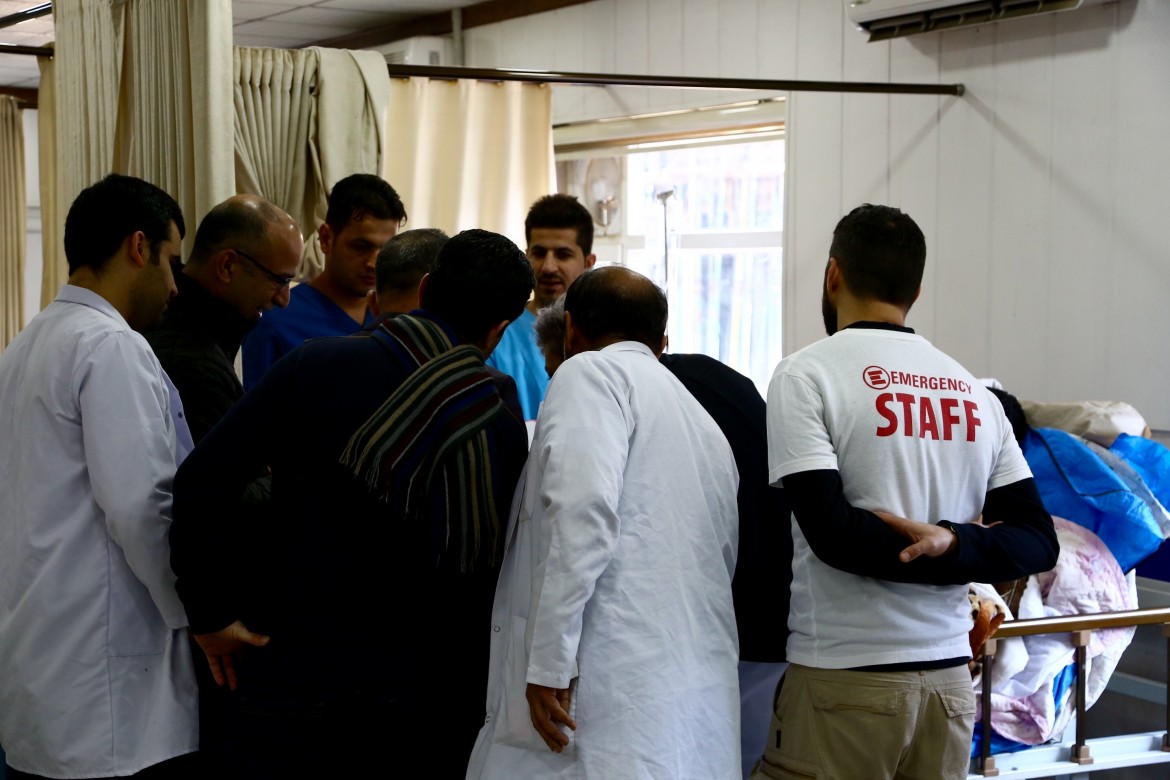Interview
How an Italian NGO is bracing for the new Mosul offensive
Emergency, an Italian aid organization, operates a hospital in Iraqi Kurdistan, just 70 kilometers from the epicenter of the war against ISIS.

Emanuele Nannini, deputy coordinator of the humanitarian office at the NGO Emergency, is preparing for the crisis that will erupt with the launch of the second phase of the counter-offensive in Mosul.
“The eastern area of Mosul is more industrial than residential, and to the west is the old city where the battle is bound to be more bloody,” he explained to il manifesto. “The streets are narrow, there are residential neighborhoods. The civilians will suffer more for the clashes. In addition, it is ISIS’ last bulwark: It will try to hold it to the death.
“Three thousand wounded have arrived from the city of Mosul, from Oct. 17 [the date the counteroffensive operation started] to mid-January. In recent weeks, there have been fewer fights. After liberating the eastern area, the Iraqi troops stopped by the river to regroup. The moment was fortunate. We have been able to increase hospital capacity while waiting for the operation to restart.”
The hospital he is talking about is the Emergency center that opened 20 years ago in Erbil, in the Iraqi Kurdistan. At the time, the Italian organization had arrived to treat the wounded in the civil war between the two main Kurdish parties, Barzani’s KDP and Talabani’s PUK.
Emergency opened two hospitals, one in Erbil and one in Sulaimaniya, the poles of power of the two clans. “In 2005, with the attenuation of the conflict and the development of the capacity of local authorities to manage the centers, we transferred the hospitals to the Ministry of Health,” Nannini said. “Emergency remained in charge of the rehabilitation center in Sulaimaniya, where we build the prosthesis and we continue to follow up on patients.”
Almost 10 years later, in June 2014, ISIS occupied Mosul and expanded into eastern Iraq. Before long, millions of Iraqis fled and reached Kurdistan, which already hosted hundreds of thousands of refugees from neighboring Syria. It was a huge influx (two million people in addition to a local population of six) that together with the growing economic crisis in Erbil made the health care system collapse.
“Emergency decided to go with a large number of expatriate staff to help the Kurdish authorities in the health management of Syrian refugees and displaced Iraqis,” Nannini said. “In the last two years, we have taken over six clinics in refugee camps, where we offer basic care, we follow chronic patients who find it difficult to access the local health care system and we promote health and hygiene.
“We’re back in touch with the two hospitals in Erbil and Sulaimaniya. Until last year, the local authorities were able to manage them, but then, because of the economic crisis, the decline in oil prices and the high number of displaced people in the area, the health system has literally collapsed. In addition, the counter-offensive on Mosul started. Many wounded went to Erbil; the city is only 70 kilometers away.”
Since January, Emergency is back in the capital of Iraqi Kurdistan. The organization came back to rehabilitate hospitals, implement safety measures, rehabilitate the departments and increase hospital capacity (which increased from about 25 to 80 beds).
But it also provides financial support to the staff. “For over a year, the local staff of 120 employees, only received 25 percent of their salary,” Nannini said. ”We will intervene with an incentives system: Many found a second job and work part time at the hospital, which results in uncovered shifts. So, they will come back at full speed to the hospital.”
Emergency is preparing for the second phase of the counter-offensive on Mosul. At the base, there is a coordination among international organizations and local authorities to allow the transfer of the war wounded to Erbil: through the Trauma Stabilization Point, the wounded are brought by Iraqi ambulances to the border with Kurdistan and there, they will be cared for by Kurdish doctors.
Nannini continues: “We are talking about war wounded, people affected by ISIS mortars, heavy Iraqi artillery and U.S. raids. But patients also come from areas already retaken by the Iraqi government, often people injured by the explosion of Islamist car bombs or explosives left behind in the city after the retreat.”
In the background, there is a country battered by decades of uninterrupted wars that fell apart after the U.S. invasion. The civilians pay the consequences: The level of destruction is immense, not only at the infrastructure level, but also at the social and psychological levels: “There is a very strong sense of trauma among displaced people,” he said. ”There is a huge uncertainty. They do not even know if they will be able to return to their villages, because of sectarian strife.”
These clashes also influence the reception in Kurdistan. If the doors were open in the first months after the conquest of Mosul, in the past two years Erbil has concocted a screening system that leave the Sunnis out.
Any person who wants to cross over to Kurdistan needs a local sponsor, more easily traced by Christians and Yazidis. “There is a big difference in the border crossings, depending on the origin, there is greater caution towards those coming from Mosul for fear that Islamists are hiding among them. The displaced people are brought to large camps in a sort of buffer zone between the ISIS and Kurdistan zones. There, a very long and tortuous screening process takes place and then, they are reallocated to other camps.”
Now a new phase starts, west Mosul will decide the fate of Iraq, its internal divisions and contradictions. On the skin of civilians.
Originally published at https://ilmanifesto.it/emergency-a-erbil-per-curare-mosul/ on 2017-02-21
